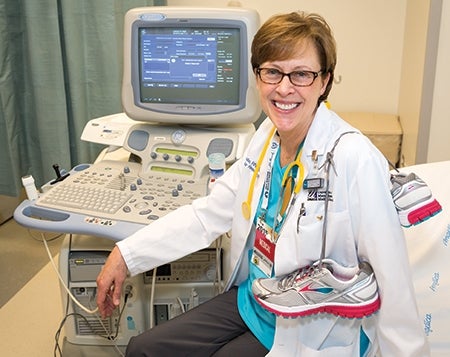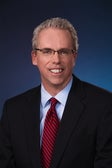UMass' marathon heart nurse
 Matt Volpini
Susan Papalia, posing with her running shoes, has 23 cardiovascular research studies in various phases.
Matt Volpini
Susan Papalia, posing with her running shoes, has 23 cardiovascular research studies in various phases.
On April 15, 2013, registered nurses Susan Papalia and Lynn Landry were among the volunteers stationed near the Boston Marathon finish line, helping runners who’d pushed themselves to the edge and were now in medical trouble.
Then, two men set off pressure-cooker bombs in the crowd.
“It basically went from this relaxed feeling, like the city’s united, to a mass casualty event in seconds,” Papalia said. “You train for it, and you hope it never happens.”
The medical team went into triage mode, giving emergency assistance to those who needed it and getting the victims to the city’s hospitals. Three people died within seconds of the blasts, but the 264 people who were injured got the treatment they needed and survived.
For the medical volunteers, there was no time to react emotionally that day, but a few days later, Papalia reached out to Landry and another friend who had been part of the team. “Susan said ‘I want to take you guys to lunch. There’s a surprise for you,’” Landry said.
When the women met up, they found Papalia had arranged a private chance for them to spend time with comfort dogs provided by Lutheran Church Charities.
“Oh my God – sob,” Landry said. “I just could not believe she thought to do this for us.”
Papalia is a researcher with decades of experience. Today, she’s a cardiovascular research nurse manager at UMass Medical School. She’s also a committed volunteer who supports multiple organizations for both humans and animals in Massachusetts and around New England.
Research of the heart
As a young woman, Papalia said she wanted to go to medical school. But the expense would have been tough for her parents, and her father held to traditional ideas about careers for women. So she ended up in nursing school and then in the medical Mecca of Boston, where she found a job working for the chief of cardiology at Tufts Medical Center. She quickly got hooked on cardiovascular research.
“It’s fascinating,” she said. “It’s the most important organ… It’s like a 1,000-piece jigsaw puzzle.”
She eventually went on to get a job with MetroWest medical device maker Boston Scientific Corp., back when it was a relatively scrappy company with only 250 employees. She traveled to Ireland and France with the company, working as the project manager of a big cardiovascular study. Papalia said she liked running studies, doing intellectual problem-solving work.
After 15 years with the company, which had grown to 29,000 employees, she was ready for something different.
“It was too big, too impersonal,” she said. “I wanted to get back to working with patients.”
For a while, Papalia bounced around the life science industry, working in research positions for various companies – “trying to find out what I wanted to do with the rest of my life,” she said. “Then, this job came across my desk one day.”
That job was at UMass, where Papalia now combines cutting-edge research with hands-on patient care. UMass Medical School and UMass Memorial Medical Center work with researchers all over the world, so they can often match patients with clinical trials that might help them better than standard treatment. Right now, Papalia said, she has 23 studies in various phases. In a month, her team may screen 500 people as potential subjects for trials and enroll 10 to 40.
Regrowing hearts
One promising therapy uses stem cells to help patients who’ve survived major heart attacks regrow heart tissue. Cells are taken from donor hearts, matched with patients – a bit like matching blood types, Papalia said – and then injected into the hearts of the patients. If the procedure works, the cells should help replace the scar tissue with new, living tissue and improve patients’ chances for continued good health.
Because UMass Memorial Medical Center is a Level 1 trauma center, Papalia said, it has heart attack patients flown in from as far away as Connecticut and Western Massachusetts. Some people have been enrolled in the study after arriving at the hospital and being flagged as likely prospects. Others did their own research and found the clinical trial.
Besides working on budgets and contracts, training other employees, and doing dozens of other tasks, Papalia likes to spend time just talking with the patients in the trial.
One evening, she conducted an assessment on an 88-year-old patient and then stayed at the hospital past 9 p.m. chatting about his marriage and his service in World War II.
“It’s really nice to be able to spend time away from the office, away from the computer,” she said. “I left smiling, just thinking of him.”
Animal, human volunteer
Papalia brings her mix of technical ability and empathy to her volunteer work, too. She and her husband, Tom, transport rescue dogs from as far away as New York and Connecticut, bringing them to rescue agencies and foster homes. And for years now, she’s been part of a team – which also includes Lynn Landry – that helps with the Boston Marathon and about a dozen other races around the region every year.
“It’s like a big race family,” Papalia said. “It’s really rewarding to pick up a runner who has fallen at the finish line, who is so sick. The team jumps into action.”
Chris Troyanos, the medical coordinator for the Boston Marathon and other area races, said he reached out to her after the bombing in 2013 when he saw how effectively she was reaching out to other personnel on Facebook groups to offer support.
He said Papalia quickly became one of his go-to people – and she and Tom became personal friends of his.
This year, she is co-running the complex finish-line medical operation for the Boston Marathon.
“She’s very empathetic,” Troyanos said. “She’s sensitive to her volunteers and the people who work around her, and she gets the big picture.”
When it comes to both her career and her volunteer work, Papilia said she doesn’t really think of the work as something she does for other people.
“It nourishes my soul,” she said. “I get enjoyment out of all this… I go to bed at night feeling fulfilled because I’m allowed to do all these things.”













0 Comments